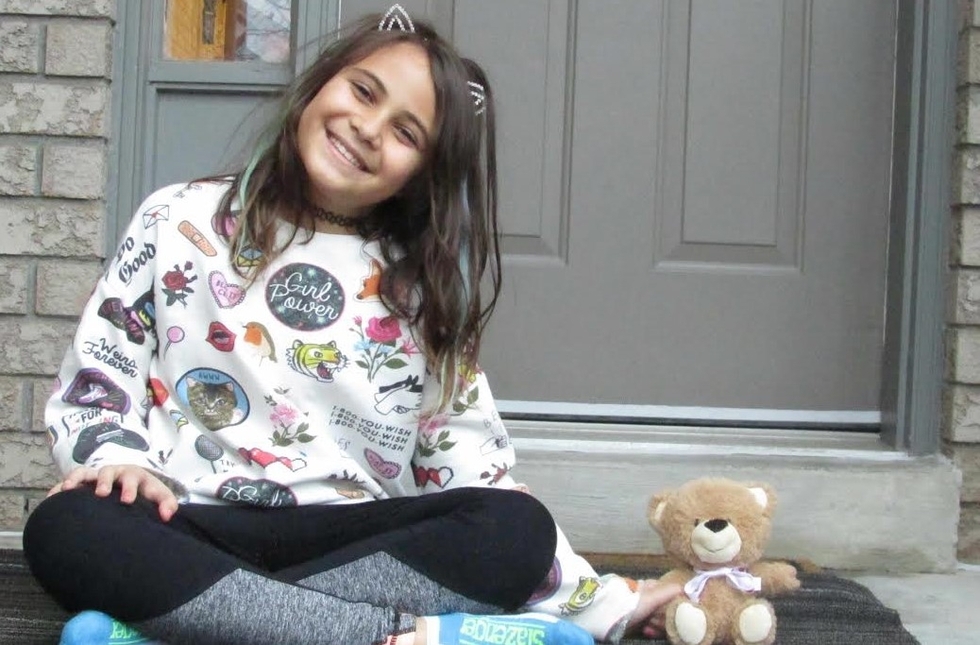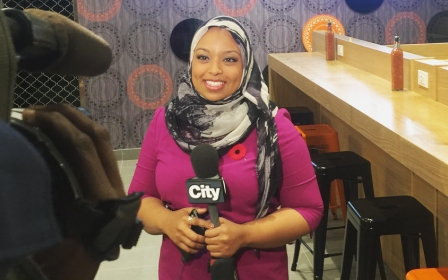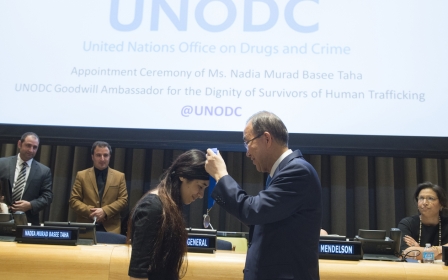Ahlan Bear: Stuffed animal welcomes Syrian children to Canada

TORONTO, Canada – Sasha Naffaa knows how lonely it can be to leave your friends behind when you move to a new country.
That’s why the fourth-grader hopes a stuffed animal, designed specifically to welcome Syrian refugee children to Canada, can help ease their difficult transition.
'Have you ever seen snow? Snow pants keep you dry. A scarf goes on your neck. I love hockey!'
“When I first came here, I didn’t have that [many] friends because I left them [in] my country. I felt really heartbroken about it,” the nine-year-old, who grew up in Lebanon and came to Canada with her family last year, told Middle East Eye.
“I thought that if I give the Syrian refugees… a huge welcome, they [would] feel, ‘this is my home now. I’m going to stay here. I’m going to succeed in life.’”
Naffaa is the voice of Ahlan Bear (“ahlan,” or “ahlan wa sahlan,” is Arabic for welcome), a small stuffed animal that debuted earlier this month in Toronto.
Wearing a white bowtie adorned with red maple leaves – the same one displayed on the Canadian flag – the Ahlan Bear speaks more than 60 phrases in English and Arabic.
Some are aimed at getting Syrian children to learn English words and phrases - Hello. Goodbye. How are you? What is your name? Where are you from? – while others have a distinctly Canadian feel.
“Have you ever seen snow? Snow pants keep you dry. A scarf goes on your neck,” the bear says. “I love hockey!” it also proclaims.
A security blanket
The idea behind Ahlan Bear came from marketing firm Rethink Canada, which brought it to COSTI Immigrant Services, an agency that helps new immigrants and has led the Syrian refugee resettlement program in the Toronto area.
Together, the groups chose what the bear would say and recorded the bilingual messages with Naffaa’s help.
They have distributed 100 Ahlan Bears to Syrian child refugees in the Toronto area so far, and another 100 are in production, according to Mario Calla, COSTI’s executive director.
Calla said Syrian children exhibit many signs of anxiety – from bed-wetting to sleeping under the bed in fear – and have internalised many of the stresses their parents and families have been under since leaving Syria.
This bear will help them cope, he said, and it serves as “a really important gesture that gives them a sense that maybe things here are different”.
Canadian Immigration Minister John McCallum hands a Syrian child the Ahlan Bear
Almost 36,000 Syrian refugees were resettled in Canada between 4 November 2015 and 27 November 2016. More than half have been sponsored by the government, which gives families financial assistance and other services for their first year in the country.
Canadian individuals, charities and other organisations sponsored more than 13,000 refugees through private sponsorship, a programme unique to Canada, and almost 4,000 others were resettled under a joint public-private sponsorship initiative.
As of 27 November, almost 20,000 additional resettlement applications were in progress. More than 4,000 applications have been approved for families who have not arrived.
“What we also know is that kids are very resilient and with love and care and security, they can outgrow these anxieties,” Calla told Middle East Eye.
“What they need is the security, and giving them this little bear, is like a security blanket for them, and a way that people are saying, ‘hey, you’re OK now.’”
One-year anniversary
For many Syrian families, December marks the one-year anniversary of the start of their new lives in Canada.
The first plane carrying 163 Syrian men, women, and children to Canada landed on 10 December 2015 at Toronto’s Pearson airport, where the families were greeted by Prime Minister Justin Trudeau, Ontario Premier Kathleen Wynne, and other officials.
"This is a wonderful night, where we get to show not just a planeload of new Canadians what Canada is all about, we get to show the world how to open our hearts and welcome in people who are fleeing extraordinarily difficult situations," Trudeau said at the time.
At the outset, many families spent months living out of hotels in the Toronto area as they searched for affordable housing in a city with sky-high rental costs. While some were quick to find employment, many remain in the process of learning English and trying to find steady work.
Earlier this week, a Senate committee on human rights urged Ottawa not to abandon Syrians at this critical juncture in the resettlement process, and called on the federal government to provide added mental health services, language training, and financial support.
"We can't abandon them. We can't let indifference set in. We need to do more to help them in their next resettlement steps," said committee chair Jim Munson, as he released the report, "Finding Refuge in Canada: A Syrian Resettlement Story.”
According to Calla, some of the early challenges Syrian refugees experienced upon their arrival in Canada remain, including difficulties learning English and finding employment.
“It may be a year later, but many of those anxieties persist until they get established. That’s why it [support] continues to be important,” he said.
Still, Calla said the resettlement process is progressing as expected: school-aged children are enrolled in local schools, families have moved into their own homes, and adults are enrolled in English lessons.
A warm welcome
Sasha’s mother, Mirna El Sabbagh, said she came to Canada with her husband, a Palestinian refugee who grew up in Lebanon, and their two children, under the skilled immigrants program in August 2015.
'I want them to feel not lonely. I want them to feel like, I have this bear with me, he’s my friend or she’s my friend' - Sasha Naffaa
Because women cannot pass their nationality on to their spouses or children in Lebanon, her children and husband “are still considered as refugees, and they are considered stateless, as well,” she said.
El Sabbagh said the Ahlan Bear brings back her own memories of growing up in Lebanon during the civil war and Israeli invasion, when she clung to a blue blanket to cope with the instability around her.
“Whenever there was fighting, my mom used to tell me, ‘Let’s hurry up and go down,’” to a safe room under their building, she recalled. “I used to take this blanket with me everywhere I go, because it gave me a sense that I’m still [at] home, I’m not down there.
“I don’t know why I related the bear to the blanket. It will hopefully give the children a sense of security,” El Sabbagh said.
Meanwhile, Sasha added that she hoped Ahlan Bear will become a lifelong friend for Syrian children now living in Canada, and “will help them know that they’re taken care of here”.
“I want them to feel not lonely,” she said. “I want them to feel like, I have this bear with me, he’s my friend or she’s my friend, and I want them to always keep him.”
New MEE newsletter: Jerusalem Dispatch
Sign up to get the latest insights and analysis on Israel-Palestine, alongside Turkey Unpacked and other MEE newsletters
Middle East Eye delivers independent and unrivalled coverage and analysis of the Middle East, North Africa and beyond. To learn more about republishing this content and the associated fees, please fill out this form. More about MEE can be found here.




